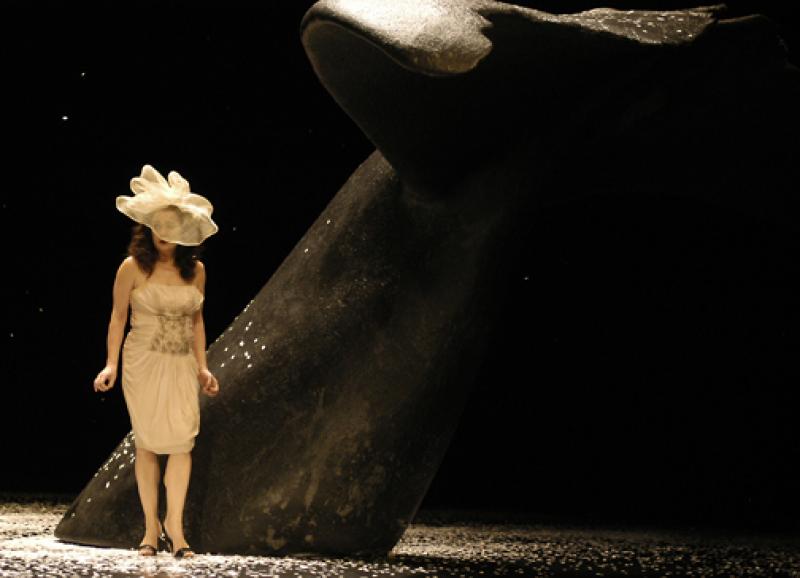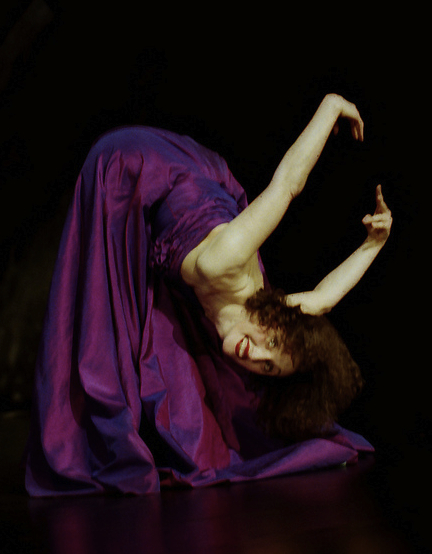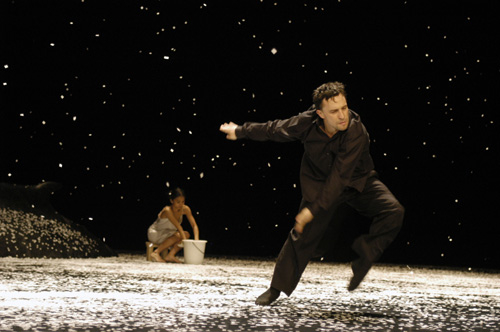Ten Chi, Tanztheater Wuppertal Pina Bausch, Barbican Theatre | reviews, news & interviews
Ten Chi, Tanztheater Wuppertal Pina Bausch, Barbican Theatre
Ten Chi, Tanztheater Wuppertal Pina Bausch, Barbican Theatre
A female dream fantasy with a phallic whale, snowy pillows and docile men doesn't ring true

The Japanese dance public is overwhelmingly female, so it’s not surprising that Pina Bausch’s paean to Saitama, Ten Chi, is so girly.
"Ten Chi" means, I understand, Heaven and Earth, and this is a safe escapist heaven for women far away from the violent gender warfare glimpsed in the Los Angeles piece, Nur Du, or the fractious flirtations in the Roman one, Viktor. While the monumental whale may equally satisfy decoders of other social subtexts (a subtle protest at fishing policy?), it actually much more invokes an erotically devised Japanese garden, the umbrella-shaped tail as much a stone quoit or animistic totem, the white-dappled floor as much a raked gravel courtyard, on which the bare female feet patter softly as cat’s paws.
Some Bauschites will be disappointed that there is very little violence and very little smoking
Some Bauschites will be disappointed that there is very little violence and very little smoking. From the start, the movement has an unaccustomedly fluid, oriental and yielding quality - a divinely silky opening solo for a woman in ivory satin slip, with long undressed hair and bare feet, suggests a soft-bodied sea creature snuggling into her shell, and a whooshy feeling permeates thanks to the stream of smoochy jazz and regretful plucked strings.
An almost constant shower of white particles offers various interpretative notions, perhaps snow on Mount Fuji, or pillow down, or spring cherry blossom, or even (finally) atomic ash. A certain connection with ageing, with ensuring that older women’s voices are heard, would also seem to have aimed at Pina’s Japanese public (nicely scheduled to follow the youth-themed ...como el musguito... at Sadler's Wells mid-week).
 A charismatic, baritonal-voiced actress, Mechthild Grossman (see main picture), barks acerbic challenges at the audience on behalf of all unfulfilled middle-aged women: “Do you know what goes really well with Champagne? Me.”
A charismatic, baritonal-voiced actress, Mechthild Grossman (see main picture), barks acerbic challenges at the audience on behalf of all unfulfilled middle-aged women: “Do you know what goes really well with Champagne? Me.”
Another Bausch veteran, the wonderfully comic Nazareth Panadero (pictured right by Ulli Weiss), giggles orgasmically as a man strips her black net dress off her piece by piece, and when he gets too frantic, she shrieks, “Slowly!” Not bad, but not in the same ironical ballpark as the grittier Bausch of the 1980s.
Much play is made of large white pillows and sleeping motifs, dreams are related of being chased by men or enacted of being pampered by men. One young hunk is made to put on a kimono and handed a dustpan and brush; others obediently sweep the females into their arms where they swim gently like naiads in the misty half-light.
 The chaps are anonymous and smart in black and white, like idealised young salarymen, and have vivid jitterbugging solos (pictured left by Bettina Stöss). The ladies wear the glamorous Pina wardrobe of slithery satin gowns that are almost negligees, in cream, hot orange, purple, bronze, colours you want to touch. Their dances are succulent with surrendering backs and winding, serpentine arms, embroidered with hand arrangements as intricately designed as peonies.
The chaps are anonymous and smart in black and white, like idealised young salarymen, and have vivid jitterbugging solos (pictured left by Bettina Stöss). The ladies wear the glamorous Pina wardrobe of slithery satin gowns that are almost negligees, in cream, hot orange, purple, bronze, colours you want to touch. Their dances are succulent with surrendering backs and winding, serpentine arms, embroidered with hand arrangements as intricately designed as peonies.
It’s very very beautiful, and very very indulgent, this dreamscape, created even more than Nur Du from little bits of things dependent on the individuality of Bausch’s riveting group of dancers, and not in the least reflective of any personal viewpoint on Japanese social structures to the extent that made Viktor powerful (or her greater community works, such as Nelken or Kontakthof). True, it finishes with a riveting hip-hop jam session, in which both sexes pile into a terrific melee of breakdance, like raging on the brink of apocalypse, but at three hours Ten Chi comes over as pretty fishy really, a gorgeous package of nothing personal.
- Der Fensterputzer (The Window Cleaner) is at Sadler's Wells Theatre, London, tonight and tomorrow
- The Pina Bausch World Cities season continues until 9 July at Sadler's Wells and the Barbican Centre, London
- Dominique Mercy, director of Tanztheater Wuppertal, will be in conversation with Sadler's Wells chief Alistair Spalding next Sunday at Sadler's Wells Theatre before the performance of Nefés
- Full listings of the Barbican Arts Centre's 2012 season
Listen to a music track used in 'Ten Chi', Beth Gibbons and Rustin Man's 'Funny Time of Year'
Explore topics
Share this article
The future of Arts Journalism
You can stop theartsdesk.com closing!
We urgently need financing to survive. Our fundraising drive has thus far raised £49,000 but we need to reach £100,000 or we will be forced to close. Please contribute here: https://gofund.me/c3f6033d
And if you can forward this information to anyone who might assist, we’d be grateful.

Subscribe to theartsdesk.com
Thank you for continuing to read our work on theartsdesk.com. For unlimited access to every article in its entirety, including our archive of more than 15,000 pieces, we're asking for £5 per month or £40 per year. We feel it's a very good deal, and hope you do too.
To take a subscription now simply click here.
And if you're looking for that extra gift for a friend or family member, why not treat them to a theartsdesk.com gift subscription?
more Dance
 'We are bowled over!' Thank you for your messages of love and support
Much-appreciated words of commendation from readers and the cultural community
'We are bowled over!' Thank you for your messages of love and support
Much-appreciated words of commendation from readers and the cultural community
 R:Evolution, English National Ballet, Sadler's Wells review - a vibrant survey of ballet in four acts
ENB set the bar high with this mixed bill, but they meet its challenges thrillingly
R:Evolution, English National Ballet, Sadler's Wells review - a vibrant survey of ballet in four acts
ENB set the bar high with this mixed bill, but they meet its challenges thrillingly
 Like Water for Chocolate, Royal Ballet review - splendid dancing and sets, but there's too much plot
Christopher Wheeldon's version looks great but is too muddling to connect with fully
Like Water for Chocolate, Royal Ballet review - splendid dancing and sets, but there's too much plot
Christopher Wheeldon's version looks great but is too muddling to connect with fully
 iD-Reloaded, Cirque Éloize, Marlowe Theatre, Canterbury review - attitude, energy and invention
A riotous blend of urban dance music, hip hop and contemporary circus
iD-Reloaded, Cirque Éloize, Marlowe Theatre, Canterbury review - attitude, energy and invention
A riotous blend of urban dance music, hip hop and contemporary circus
 How to be a Dancer in 72,000 Easy Lessons, Teaċ Daṁsa review - a riveting account of a life in dance
Michael Keegan-Dolan's unique hybrid of physical theatre and comic monologue
How to be a Dancer in 72,000 Easy Lessons, Teaċ Daṁsa review - a riveting account of a life in dance
Michael Keegan-Dolan's unique hybrid of physical theatre and comic monologue
 A Single Man, Linbury Theatre review - an anatomy of melancholy, with breaks in the clouds
Ed Watson and Jonathan Goddard are extraordinary in Jonathan Watkins' dance theatre adaptation of Isherwood's novel
A Single Man, Linbury Theatre review - an anatomy of melancholy, with breaks in the clouds
Ed Watson and Jonathan Goddard are extraordinary in Jonathan Watkins' dance theatre adaptation of Isherwood's novel
 Peaky Blinders: The Redemption of Thomas Shelby, Rambert, Sadler's Wells review - exciting dancing, if you can see it
Six TV series reduced to 100 minutes' dance time doesn't quite compute
Peaky Blinders: The Redemption of Thomas Shelby, Rambert, Sadler's Wells review - exciting dancing, if you can see it
Six TV series reduced to 100 minutes' dance time doesn't quite compute
 Giselle, National Ballet of Japan review - return of a classic, refreshed and impeccably danced
First visit by Miyako Yoshida's company leaves you wanting more
Giselle, National Ballet of Japan review - return of a classic, refreshed and impeccably danced
First visit by Miyako Yoshida's company leaves you wanting more
 Quadrophenia, Sadler's Wells review - missed opportunity to give new stage life to a Who classic
The brilliant cast need a tighter score and a stronger narrative
Quadrophenia, Sadler's Wells review - missed opportunity to give new stage life to a Who classic
The brilliant cast need a tighter score and a stronger narrative
 The Midnight Bell, Sadler's Wells review - a first reprise for one of Matthew Bourne's most compelling shows to date
The after-hours lives of the sad and lonely are drawn with compassion, originality and skill
The Midnight Bell, Sadler's Wells review - a first reprise for one of Matthew Bourne's most compelling shows to date
The after-hours lives of the sad and lonely are drawn with compassion, originality and skill
 Ballet to Broadway: Wheeldon Works, Royal Ballet review - the impressive range and reach of Christopher Wheeldon's craft
The title says it: as dancemaker, as creative magnet, the man clearly works his socks off
Ballet to Broadway: Wheeldon Works, Royal Ballet review - the impressive range and reach of Christopher Wheeldon's craft
The title says it: as dancemaker, as creative magnet, the man clearly works his socks off
 The Forsythe Programme, English National Ballet review - brains, beauty and bravura
Once again the veteran choreographer and maverick William Forsythe raises ENB's game
The Forsythe Programme, English National Ballet review - brains, beauty and bravura
Once again the veteran choreographer and maverick William Forsythe raises ENB's game

Add comment